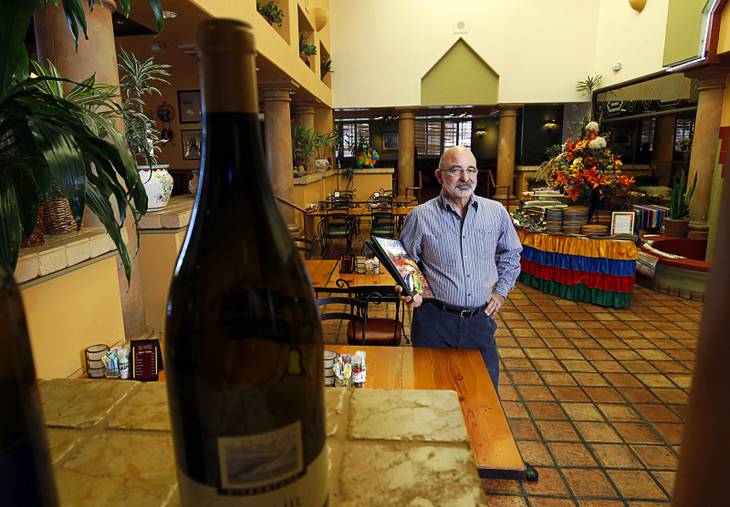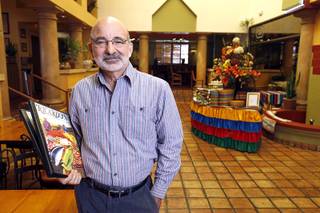Congressional inaction on U.S. immigration policy has frustrated Americans from all walks of life. But it’s especially frustrating for people in the restaurant industry — including in Las Vegas, where food service is a major cog in the region’s economy.
“Today’s immigration system is broken,” officials with the National Restaurant Association said.
“It makes economic sense to fix it. But if Congress and the president don’t repair the broken immigration system, restaurants and other businesses will have a difficult time finding the employees they need to operate and grow. The result: slower economic growth and fewer new opportunities.”
Robert Ansara, owner of Ricardo’s, a Mexican restaurant that has operated since 1979 in Las Vegas, called immigration a huge topic, “given the percentage of immigrant workers in the food service/hospitality industry.” He confessed to some confusion about the government’s four-plus-decade approach to immigration.
“All of those 40 years are punctuated by this administration’s attempt to change the law,” Ansara said.
In November, President Barack Obama announced a series of executive actions to grant as many as 5 million undocumented immigrants protection from deportation. Nevada is one of 26 states challenging the program in court.
Rules change all the time, Ansara said, “but it seems that any real reform or change has stalled by the national debate over immigration reform — ‘dreamers,’ amnesty, path to citizenship, etc.”
Nevada, he said, is “no more unique than the other Southwest states where immigration has played such a major factor in population growth and demographic shifts.”
“Politics and economics are one huge, nasty ball of twine that cannot be unraveled,” said Michael Johnson, managing partner of the Sporting Life Bar in Las Vegas. “While the immigrant issue is a discussion for the community, for the individual operator, immigrants are a boon and the big white elephant in the room. They work for less. Not only have we seen U.S. restaurants blossom because of the immigrant worker, but it turns out the immigrant worker does not have their own idea of how the menu should be executed. They do it the same way every time. Consistency is key.”
Johnson believes immigration reform and minimum-wage increases are bound together.
“Should either of those go through, the population needs to be prepared for a $15 hamburger at their local joint,” Johnson said.
As an industry, restaurants have two ways of coping, Johnson said — “either increase prices drastically or reduce service levels. Your burger now costs $15 or it takes 30 minutes. What does the populace want?”
John Arena, who with cousin and fellow third-generation pizza-maker Sam Facchini owns and operates six Metro Pizza restaurants across the Las Vegas Valley, said restaurants benefit from immigrant labor, and immigrants benefit from the work.
“Traditionally, our industry relies heavily on immigrant labor, and immigrants rely on us as providers of opportunity,” Arena said. “Through hard work, today’s restaurant laborer will become tomorrow’s business owners. I have seen this cycle repeated in my own family.”
What business needs, Arena said, is comprehensive reform “structured to serve the best interests of our nation, not just designed to get votes based on raw emotion.”
The restaurant industry “needs a system of verification that is accurate and workable,” he said. “As it stands right now, the difficulty of verification combined with the penalties have created an atmosphere of fear and confusion.”
Nevada and the Southwest are particularly vulnerable, Arena said, “because we have a service-based economy combined with proximity to a porous border. Inflammatory statements by political candidates are only adding to the challenge of creating a system that should be offering realistic reforms and will provide a safe and legal workforce for our industry.”
Arena said every restaurateur he knows is trying to comply with regulations, be a good steward to employees and serve the needs of guests.
State-by-state differences
Challenges vary regionally, said Carolyn Richmond, who co-chairs the hospitality practice group and labor and employment department at law firm Fox Rothschild in New York.
“For instance, tech-dependent regions are particularly vulnerable to changes in visa laws and limits,” Richmond said. “Cities such as Miami, New York and Los Angeles have very different concerns.”
Compliance with U.S. immigration laws varies from state to state, Richmond said, “and often depends on the sophistication of the business. The I-9 form was recently revised and expanded. While not generally complicated, it can be cumbersome for already-overburdened managers.”
State-to-state differences appear mainly in verification, “which is something we are trying to change,” said Angelo Amador, senior vice president and regulatory counsel for the National Restaurant Association. “We want to have one law of the land so that everyone is clear as to what they have to do.”
“The most important thing is (operators) need to stay up to date with changes, on both a national and state basis,” Amador said. “The requirements seem to be constantly shifting, which is something that we hate, but it is what it is.”
Greatest challenge
Staffing for restaurants always is a concern, “especially in a market with a population at the age of 16 to 24 not growing and no final consistent reform measures on immigration in place,” said Brian McDonough, senior human resources consultant for Synergy Restaurant Consultants in California. “Food-service operations traditionally promote to leadership positions from within the current ranks of employees. A strong, healthy, legal base of staff at the lower levels feeds management and leadership positions in the future. Restaurants are a leading employer of entry level jobs. Immigration is one main source of staffing at this level.”
The immigration issue is hurting the industry in a number of ways, McDonough said. Because of inconsistent compliance systems throughout the country, immigrants gravitate toward states that don’t require stringent background checking systems, he said.
Another pitfall is paperwork.
“Major functions of entire departments of large chains are relegated to the function of ensuring that I-9s and any other mechanism for ensuring authority to work in the Unites States are complied with,” McDonough said.
The greatest challenge to compliance can be the system itself, he added.
“Managers are hired and trained to run restaurants; the issue of compliance with immigration laws is the job of the federal government,” McDonough said.
E-Verify, an online system that compares information from an employee’s I-9 form with data from the U.S. Department of Homeland Security and Social Security Administration to confirm employment eligibility, isn’t required by the federal government for nonpublic jobs and isn’t required in all states. Restaurants in states that require E-Verify are at a disadvantage for landing immigrant employees.
The program was intended to assist with hiring, but “it actually has made it more difficult and, at best, caused more immigrants to go underground,” McDonough said.



